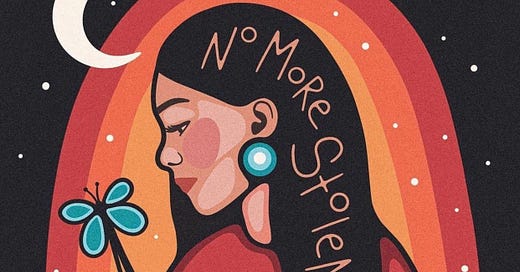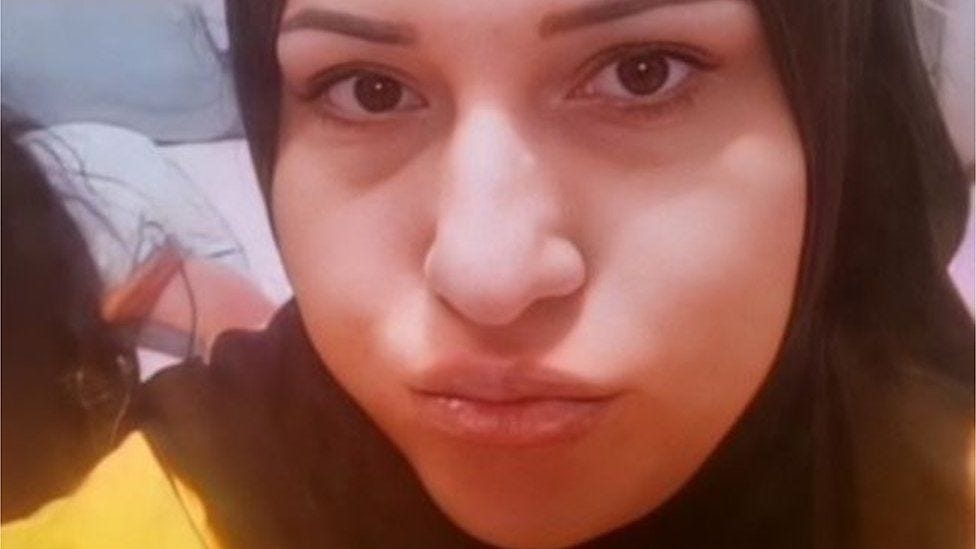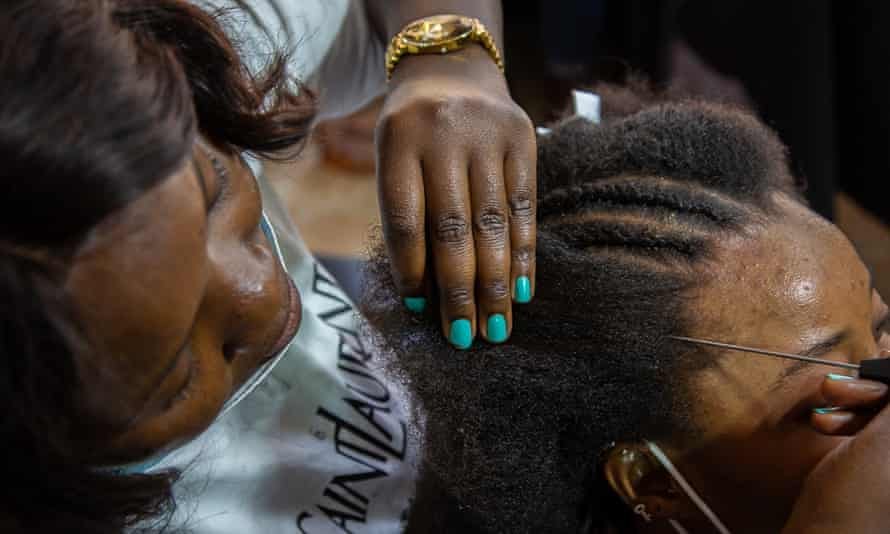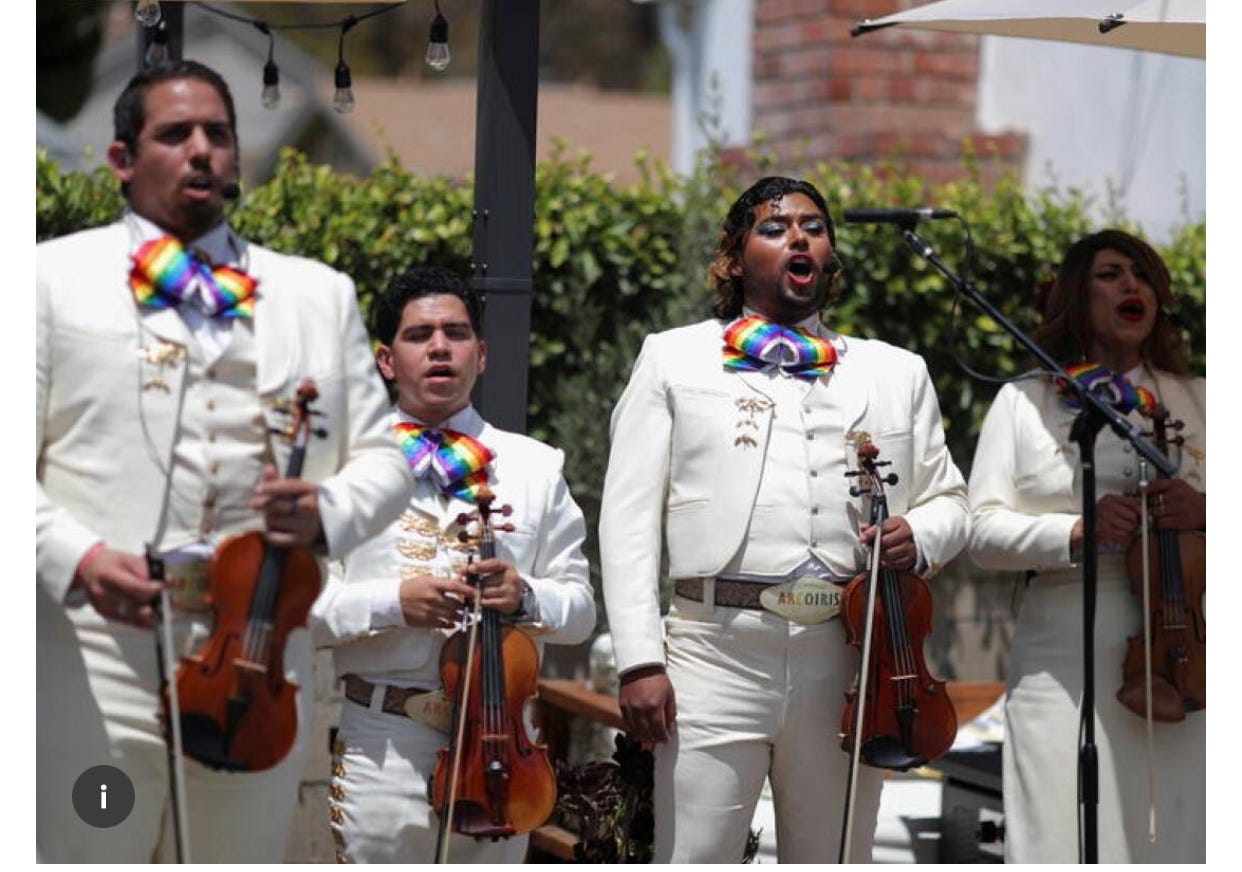Global Roundup: Instagram deletes MMIWG2S Posts, Gender-based Violence in France, Sexual Offences Bill in Uganda, Natural Haircare in Senegal, and LGBTQ+ Mariachi Band
Compiled by Samiha Hossain
Art by Alanah Jewell/Morning Star Designs
May 5th was Red Dress Day, a day in Canada and the U.S. that coincides with the National Day of Awareness for Missing and Murdered Indigenous Women and Girls and 2Spirit People. (MMIWG2S). On the day, people in Canada wore red and hung red dresses and ribbons, but several activists have experienced their posts on MMIWG2S disappearing on social media. For instance, Emily Henderson, a Toronto-based Inuk arts and culture writer, had her four-part Instagram post raising awareness for MMIWG2S vanished from her friends’ Instagram stories.
On the day when we're doing the most grieving and the most processing, and this is an incredibly heavy experience for the community, that suddenly the voices, our voices, our resources, our stories are just kind of wiped without a trace or explanation. – Emily Henderson
Many of Henderson’s friends from both Canada and the U.S. also had their stories disappearing from Instagram. She believes it is “suspicious” that only MMIWG2S posts are being targeted and that it feels like Indigenous people are “being gaslit by the algorithms.” During the pandemic, options for in-person engagement with the community are limited, so social media is particularly important for “maintaining community connections'' and sharing information that is not normally present in mainstream media.
Instagram communications released a tweet saying they are aware some people have been experiencing issues and that it is a “widespread global technical issue not related to any particular topic.” However, Shanese Steel, who is Anishinaabe-Métis and Trinidadian, says that her posts are often shadow banned by social media platforms.
I've noticed that it's happening a lot to Black and Indigenous and brown folks who are talking about political things. – Shanese Steel
Marginalized activists have been saying for some time that they are being targeted by social media. This form of censorship should be taken seriously and further investigated, so that their important activism, work and community relationships that span across the world are not erased.
------------------------------------------------------------------------------------------------------
Chahinez photo by AFP via BBC
The husband, Mounir B, fled the scene after the attack and was arrested 30 minutes later. He said during the investigation that he wanted to “punish” his wife. Last June, he was sentenced to 18 months in prison on charges of domestic violence. However, half of that time was suspended. He was banned from contacting or approaching Chahinez once he was released. In March, Chahinez contacted the police to report she had been attacked by Mounir B, but they could not locate him.
Hundreds gathered earlier this week to pay tribute to Chahinez. She is the 39th woman to be killed by a partner or ex-partner this year. According to La Fondation des Femmes, guns are used in a third of killings of women by current or former partners or family members. They said the interior ministry has ignored their “repeated warnings” about violent partners having guns. They also raised questions as to why Mounir B was not wearing an electronic tag at the time of the attack.
Chahinez’s violent murder is horrifying and yet another example of police negligence resulting in a woman’s death. Gender-based violence continues to be an urgent issue around the world. Women, activists and rights groups are demanding immediate action.
------------------------------------------------------------------------------------------------------
PROTEST AGAINST THE AMOUNT AND HANDLING OF POLICE INVESTIGATIONS INTO MURDERS AND KIDNAPPINGS OF WOMEN IN KAMPALA ON JUNE 5. PHOTO SUMY SADURNI/AFP VIA GETTY IMAGES
Earlier this week, Uganda’s parliament passed a Sexual Offences Bill that is meant to prevent sexual violence and protect victims. The bill covers a wide range of issues such as establishing a national sex offenders register and legislates against an array of crimes, from workplace harassment to child marriage. However, women’s groups and survivors are outraged that the final version of the bill has removed a clause recognizing that women can withdraw consent before or during a sexual act, as members of parliament failed to agree on a definition of consent.
According to Uganda’s recently-released 2020 crime report, domestic violence rose by 29% and statutory rape increased by 3.8% amid the national lockdown; 3,331 statutory rape cases and 335 rape cases were among the cases not investigated despite police having enough evident to prosecute. More than half of the survivors that talked to VICE World News for their investigation into police mismanagement of gender-based violence cases in Uganda said they “experienced corrupt handling of their cases, and many felt they were not being taken seriously or were victim-blamed when they went to the police.” Many perpetrators used their money and influence to criminalize the survivor as well. Activists fear that the new bill’s criminalization of “false allegations'' will only exacerbate this issue.
You cannot put a clause which criminalises the reporting of sexual abuse in a society where reporting is so low and so many hurdles to reporting exist. We live in a society that is very gender imbalanced, that is classist. Whoever has money can negotiate the system... So who is going to benefit from that clause? – Rosebell Kagumire, editor of African Feminism.
The bill also features amendments reinforcing colonial-era laws that criminalize gay sex and sex work. For instance, criminalization of same-gender sexual relations now also includes women who have sex with women. Adrian Jjuuko, Executive Director of the Human Rights Awareness and Promotion Forum, says that the bill will likely increase forced anal examinations upon arrest. In addition, sex worker rights activist Shira Natenda says the bill’s definition of sex work as “sexual exploitation” further marginalizes sex workers that engage in the act willingly.
Uganda’s new Sexual Offences Bill is appalling and activists and survivors are making it known that these new laws will further disadvantage people who already experience rampant levels of discrimination in society.
------------------------------------------------------------------------------------------------------
Stylist Florida Ngouma braids a customer’s hair at Salon Tra, which specialises in natural African hair styles, Dakar, Senegal April 2021. Photograph: Annika Hammerschlag/The Guardian
In recent years, there has been a surge of women-led organic hair and skincare businesses challenging colonial standards of beauty in Black majority countries such as Senegal and Nigeria, and diasporas.
Twenty-two-year-old Khadidiatou Ba’s struggles with her hair texture and having dark skin as a woman in Senegal led her to creating a blog on Black haircare. Today, she has her own salon called “Afro Feewi” that she describes as a “safe space” that hosts community groups and free hair consultations. Young women in her salon share natural haircare advice and challenge misconceptions that wearing natural hair is not beautiful.
We really work on self-esteem, self-love and self-acceptance, which is the hardest part. We’re sellers, psychologists, friends. – Khadidiatou Ba
Relaxing the hair is a common practice of chemically straightening the hair, which causes breakage and damage. It is however prevalent due to Eurocentric beauty ideals in Senegal. Relaxing damaged Ba’s hair and left her scalp sore, so she started researching the best natural remedies to use. Her products include ingredients sourced from Senegal and neighbouring west African countries, through predominantly female market sellers and traders.
It is uplifting to see women like Khadidiatou Ba rejecting harmful beauty standards that have excluded Black women for so long. Not only are they creating local businesses, they are also creating communities that will undoubtedly make it easier for the next generation to practice self-love and self-care.
------------------------------------------------------------------------------------------------------
Andres Gamino, Angel Daniel Gonzalez,?Ayan Vasquez-Lopez and?Natalia Melendez, members of mariachi band "Mariachi Arcoiris", perform during a streamed concert on Cinco de Mayo from a backyard in Whittier, California, U.S., May 5, 2021. REUTERS/Lucy Nicholson
Carlos Samanieg is a gay Mariachu musician who formed the first LGBTQ+ mariachi band, which recently played on the Mexican holiday of Cinco de Mayo in the Los Angeles area. Being bullied by other mariachis and the discrimination led him to creating his own group. He formed the first iteration of the group 20 years ago with other gay men, which eventually faded. However, in 2014, he formed a new, more diverse group of lesbian, gay, bisexual, transgender, non-binary, asexual and pansexual members.
I wanted to create an environment for musicians like myself, where we can be free, and we can just be who we are authentically and perform our music without having to worry about the bullying. – Carlos Samaniego
Natalia Melendez, a transgender violinist and singer, said she often hears from queer and Latino musicians who see her as an inspiration.
When I did transition, I didn't realize I was going to be a pillar for others. I do feel I have to take responsibility. I owe it to my community and to show the world that we are to be respected. – Natalia Melendez
Carlos Samanieg and his band are challenging traditional heteronormative masculine spaces and finding success doing so. The discrimination LGBTQ+ communities face is disheartening, but these communities continue to take up space.
------------------------------------------------------------------------------------------------------
Samiha Hossain (she/her) is a student at the University of Ottawa. She has experience working with survivors of sexual violence in her community, as well as conducting research on gender-based violence. A lot of her time is spent learning about and critically engaging with intersectional feminism, transformative justice and disability justice.
Samiha firmly believes in the power of connecting with people and listening to their stories to create solidarity and heal as a community. She refuses to let anyone thwart her imagination when it comes to envisioning a radically different future full of care webs, nurturance and collective liberation.








